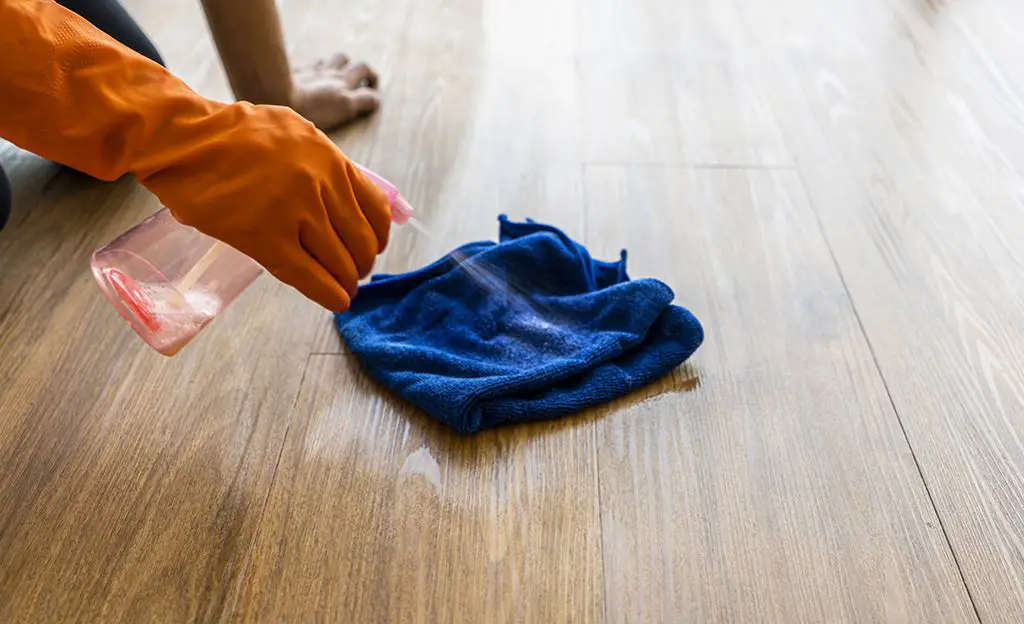Vinegar is often touted as a natural and safe cleaning solution for many surfaces, including vinyl flooring. However, there are some important factors to consider before using vinegar on vinyl floors.
Page Contents
Can vinegar damage vinyl floors?
Vinegar is an acidic solution with a pH of around 2-3. Most vinyl flooring is designed to withstand mildly acidic or alkaline cleaners in the pH range of 5-9. Using vinegar, which is more acidic, could potentially damage the floor over time. Here are some potential risks of using vinegar on vinyl floors:
- Discoloration – The acids in vinegar can react with the vinyl and cause it to become discolored or fade, especially if the floors have a pattern.
- Dulling of the finish – Vinegar can erode away the glossy vinyl finish, making it appear dull and worn.
- Weakening of seams – On sheet vinyl, the seams may become damaged and separate after repeated exposure to vinegar’s acidic properties.
- Damage to grout – Any grout lines on vinyl tile can be degraded by vinegar over time.
So while a diluted vinegar solution is unlikely to cause immediate major damage, over the long-term it can negatively impact the look and durability of vinyl flooring.
Is it ever safe to use vinegar?
Diluted vinegar may be safe to use occasionally for cleaning vinyl floors. Here are some tips:
- Use white distilled vinegar diluted with water at a ratio of 1:3 (1 part vinegar to 3 parts water). This helps reduce the acidic concentration.
- Rinse the floor thoroughly after cleaning vinegar to minimize acid residue buildup.
- Limit vinegar use to small areas and spot clean only when needed.
- Test vinegar in an inconspicuous area first to check for any damage.
- Avoid using vinegar on new, unfinished, or recently resealed vinyl floors.
So the consensus is that vinegar is OK for periodic use on established vinyl floors. But it should not be part of a regular cleaning regimen for vinyl.
What are safer alternatives to clean vinyl floors?
There are several effective and vinyl-safe alternatives to vinegar for cleaning and maintaining your floors:
Water
Plain water is likely the safest cleaning agent for vinyl floors. For light cleaning, simply mopping with warm water can lift dirt and debris without being too harsh on the floors.
Mild soap
Standard household floor cleaners, diluted as directed, are formulated to be gentle on vinyl. Look for brands marked as safe for vinyl.
Baking soda
Make a paste with baking soda and water and use it to scrub vinyl floors without scratching. Baking soda is mild, non-acidic, and helps deodorize.
Hydrogen peroxide
A hydrogen peroxide solution of 1 part hydrogen peroxide diluted with 4 parts water can disinfect vinyl floors without harsh chemicals.
Club soda
The carbonation in club soda can help lift dirt from vinyl floors gently when used for mopping.
Tips for cleaning vinyl floors without vinegar
Here are some top tips for safe, effective vinyl floor cleaning:
- Sweep or vacuum regularly to remove dust and debris, which can scratch floors.
- Wipe up spills immediately to prevent staining.
- Mop using overlapping strokes, not circular motions.
- Rinse the mop head often in clean water.
- Use floor mats at entryways to minimize tracked-in dirt.
- Follow the manufacturer’s care guidelines for your specific floors.
- Avoid abrasive scouring pads, steel wool, or harsh cleaners.
- Consider reapplying floor finish or wax periodically per recommendations.
- Disinfect using hydrogen peroxide, not vinegar.
Conclusion
While vinegar may seem like a safe cleaning solution, it can actually do more harm than good when used regularly on vinyl flooring. The acidic nature of vinegar can degrade vinyl over time. For routine vinyl floor care, it’s best to stick to mild, gentle cleaners specifically designed for vinyl. Limit vinegar to small area spot cleaning only when needed. With the right techniques and products, you can safely clean vinyl floors without using vinegar.

